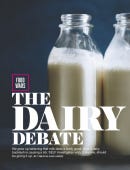
The Danger of Demon Nutrients

So my dad (hi Dad!) came to visit last weekend. And when he got himself a bowl of cereal for breakfast, he was slightly scandalized to realize that we only keep whole milk in the house. He's been on Team Skim Milk since the early 1980s; when I was growing up, we never had anything else on hand. In fact, when I started buying whole milk a few years ago, it actually took me awhile to like the flavor. Skim milk has its haters now, but it's a delightfully unobtrusive presence in a bowl of Cheerios. Whole milk, if you're not used to it, tastes so much thicker and richer, I had to get over feeling like I was mixing my cereal with Elmer's glue. I think my dad felt like he was eating ice cream for breakfast.
Of course, such feelings about milk types are entirely socially conditioned. After a few years of drinking whole milk, skim now tastes, to me, like slightly chalky tap water. My Cheerios demand the robust creaminess of whole milk. They feel empty without it. (I have no opinion on 1% or 2% milk because I've never bothered with what seems to be so clearly a marketing ploy designed to lull fat-craving Americans into some sense of health virtue.) But the whole vs. skim milk debate has never been about flavor anyway — it's about fat and whether eating fat makes us fat. Low-fat dairy was nutritional gospel in the United States up until a few years ago, when all the major health and nutrition organizations began awkwardly reversing their positions. If you want the full story check out Alice Park's 2015 Time Magazine piece, which ran with a stick of butter on the cover. And of course it was Gary Taubes' controversial New York Times Magazine piece "What If It's All Been A Big Fat Lie?" that put the debate on the map in 2002, though it took another decade before everyone else got on board. (I also touched on the fat question in my 2015 Self story, "The Dairy Debate," pictured above.)
Salt and eggs have been on similar journeys of nutritional redemption. Red meat remains polarizing, but has its Paleo apostles spreading the word. Meanwhile, carbohydrates, once hailed as the bedrock foundation of our food pyramid, have been steadily falling from grace for the last 20 years or so, with sugar now public enemy number one. (Again, thanks in large part to Gary Taubes.) It's exhausting and annoying to keep up with the shifting science, but even worse is how this good food/bad food paradigm has derailed our ability to enjoy eating. It's also come to dominate all scientific research on nutrition and health.
A few weeks ago, I interviewed Michael Tordoff, PhD, a food psychologist at the Monell Chemical Senses Center in Philadelphia. His research suggests that it's not any one food that makes us fat or unhealthy, it's what he calls the "supermarket diet" where we eat a complicated mix of fat, sugar, and everything else. When Tordoff fed three groups of rats diets that were high in sugar, fat, or a combination thereof, it was only the last group, eating a mixture of foods, that repeatedly gorged themselves. But Tordoff doesn't know why. "Is it about how certain combinations of nutrients interact? Is it about the timing of when we eat different foods? Is it about the variety of tastes in this diet? We have no idea," he says. The supermarket diet's impact may also go beyond physiological factors; why we overeat certain foods is deeply rooted in our memories, emotions and culture — not to mention our experience of whether a food is allowed or forbidden. Tordoff and many other researchers have proposed studies that would examine all of those questions, in rats, but also in humans. But they can't get them funded. "The National Institutes of Health is only interested in single nutrient research," Tordoff says. "And the food industry won't fund this kind of work because it won't help them launch new products."
The upshot is that the average grocery shopper approaches their supermarket armed with lists of foods they can and cannot eat, as well as the assumption that sticking to those lists will somehow inoculate us against diabetes, heart disease, cancer, and of course, obesity. In fact, many of those lists are all wrong, or contain uncertain gray areas: 30 percent of Americans don't know whether quinoa is healthy and 12 percent are quite sure it isn't, according to this new survey. (Meanwhile, over 90 percent of nutritionists surveyed said it was great.) One in five Americans were similarly confused about tofu, hummus and sushi, and nutritionists and regular folk alike were equally split on how to rate... wait for it... butter, cheese and whole milk. Single nutrient research hasn't made us smarter about food. It's just made us weird about eating. It's spawned overly simplistic public health messages and hugely profitable diet brands all devoted to demonizing some foods and worshipping others, without actually making us any healthier. And it means we're ignoring the opportunity to explore other questions — like how much being poor, stressed, or sleep-deprived impacts your weight and health, or how much weight and health even have to do with each other in the first place — that could lead to far more profound health outcomes. Not to mention the freedom to buy whatever kind of milk you like, just because you like how it tastes on your Cheerios.
PS. Even this sugar thing may be starting to see pushback. I haven't had a chance to read up on all this research yet, but this new article caught my eye, especially its mention of something called the Australian Paradox,"first identified in research in 2013, that showed that although Australians significantly cut their sugar consumption between 1980 and 2010, obesity rates trebled over the same period." It's unlikely to have been a causal effect, but the bigger point is that laser focusing in on one food is causing us to miss all of the other factors contributing to widespread population changes in body size and health.
***
[Excuse the repost from last week — I'm still looking for these folks! Please feel free to forward around to anyone you might know who fits the bill.]
1. Want to be in an article?
(Yes this one is totally off-topic from food.)
I'm looking to interview women in their 30s and 40s who rely on any kind of over-the-counter medication (especially allergy meds, sleep aids, or pain relievers) to get through their day or night. What are you taking, how long have you been taking it, and are you worried you're starting to get hooked or experience side effects?
2. Want to be in an another article?
I'm investigating the connections (or lack thereof) between obesity and fertility. So if you're a woman of reproductive age who is overweight or obese and have been told that your weight is the reason you can't get pregnant, I'd love to talk to you.
***
Want to be in the book?
If you've ever had to feed yourself or your family while receiving Supplemental Nutrition Assistance (food stamps), or if your family ever experienced "food insecurity" (the fancy academic term for hunger — you weren't able to buy enough food to feed everyone), I'd love to hear your story.








